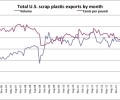APR announces pharmacy stock bottle recycling resources
APR announces pharmacy stock bottle recycling resources
<![CDATA[
The Association of Plastic Recyclers (APR), Washington, has developed resources for pharmacies to recycle stock bottles. In support of APR’s primary goals to increase the supply and enhance the quality of recycled plastics, pharmacy stock bottles have been identified as a highly marketable, quality stream of high-density polyethylene (HDPE), the organization says.
“Pharmacies offer a unique grocery store waste reduction opportunity,” says Liz Bedard, APR rigid plastics recycling director. “Many pharmacies are making the switch from disposing of large volumes of stock bottles to setting up dedicated pharmacy stock bottle recycling collection bins.”
Pharmacy waste is divided evenly between stock bottles and paper, the APR says. Through the combination of a pharmacy stock bottle recycling program and a paper recycling program, grocery stores and pharmacies can achieve zero waste status with no incremental labor costs, waste hauling and disposal savings, as well as potential revenue.
“As we have seen the Recycling Grocery Rigid Plastics program grow to include 32 states, 10 national chains and 4,500 stores, a Pharmacy Stock Bottle Recycling program was the next logical step,” says Steve Alexander, APR executive director. “These new resources expand on APR’s efforts to enhance the quality and increase the supply of recycled plastics through extensive technical resources.”
The APR says its pharmacy resources have been added to the “How to Recycle Grocery Rigid Plastics Guidebook” and include simple steps for a recommended approach to starting the program, photos, potential revenue figures, sample signage, frequently asked questions and a case study outlining the success story of a Stop & Shop pharmacy.
“Grocery rigid plastics have proven to be a good, clean source of HDPE,” says J. Scott Saunders, general manager of KW Plastics Recycling, Troy, Alabama, and chair of the APR board of directors. “The pharmacy stock bottle recycling program is yet another example of how APR works to seek additional feedstock of material to recycle.”
More information is available at http://recyclegroceryplastics.org.
]]>
Source: Recycling Today
APR announces pharmacy stock bottle recycling resources
<
